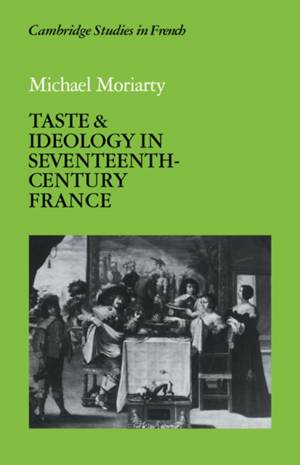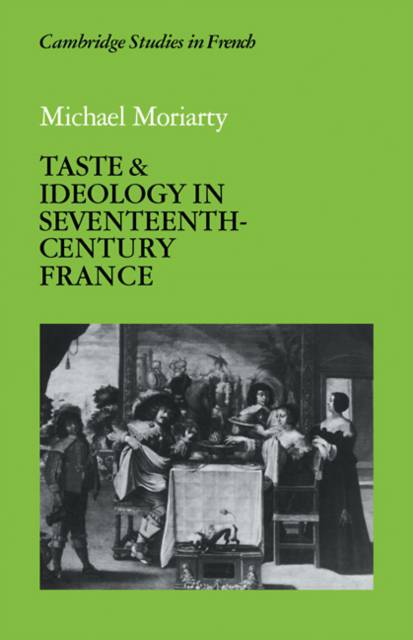
Bedankt voor het vertrouwen het afgelopen jaar! Om jou te bedanken bieden we GRATIS verzending (in België) aan op alles gedurende de hele maand januari.
- Afhalen na 1 uur in een winkel met voorraad
- In januari gratis thuislevering in België
- Ruim aanbod met 7 miljoen producten
Bedankt voor het vertrouwen het afgelopen jaar! Om jou te bedanken bieden we GRATIS verzending (in België) aan op alles gedurende de hele maand januari.
- Afhalen na 1 uur in een winkel met voorraad
- In januari gratis thuislevering in België
- Ruim aanbod met 7 miljoen producten
Zoeken
Omschrijving
This book analyses the use of the crucial concept of 'taste' in the works of five major seventeenth-century French authors, Méré, Saint Evremond, La Rochefoucauld, La Bruyère and Boileau. It combines close readings of important texts with a thoroughgoing political analysis of seventeenth-century French society in terms of class and gender. Dr Moriarty shows that far from being timeless and universal, the term 'taste' is culture-specific, shifting according to the needs of a writer and his social group. The notion of 'taste' not only helped to shape a new dominant culture, but also registered the conflicts within that culture between a view of taste that presupposted the values of 'polite society' as an exclusive (though not necessarily aristocratic) group, and a view that stressed the value of the classical-humanist tradition as a source of standards ratified by a broader public. this study sheds light not only on the central concept, but also on the individual authors discussed and on the norms of French classical literature in general.
Specificaties
Betrokkenen
- Auteur(s):
- Uitgeverij:
Inhoud
- Aantal bladzijden:
- 244
- Taal:
- Engels
- Reeks:
- Reeksnummer:
- nr. 25
Eigenschappen
- Productcode (EAN):
- 9780521113366
- Verschijningsdatum:
- 18/06/2009
- Uitvoering:
- Paperback
- Formaat:
- Trade paperback (VS)
- Afmetingen:
- 140 mm x 216 mm
- Gewicht:
- 312 g

Alleen bij Standaard Boekhandel
+ 129 punten op je klantenkaart van Standaard Boekhandel
Beoordelingen
We publiceren alleen reviews die voldoen aan de voorwaarden voor reviews. Bekijk onze voorwaarden voor reviews.









